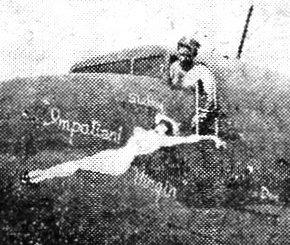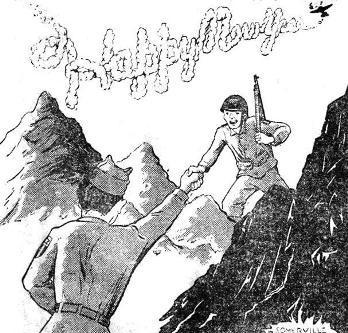|
Maj. Gen. A. C. WEDEMEYER |
|
|

VOL. III NO. 16 REG NO. L5015 DELHI, THURSDAY DECEMBER 28, 1944
|
|
GEN. SULTAN'S HQ., NORTH BURMA - Troops of the Northern Combat Area Command made good progress this week in the Central Burma campaign as British and Chinese troops moved south, occupying several towns and villages.
British troops of the 36th Division, moving from Indaw, occupied the Irrawaddy River town of Tigyiang, 42 miles south of Katha. No Japs were found there.
Eastward, Chinese forces, swinging in from the north, cut the Bhamo-Namkham road at the 52-mile point, nearly 10 miles beyond Hkalum, which was captured two days earlier. The Japs, who are dug in, are being encircled in their mountain positions.
The troops that cut the road are now about 20 miles from Namkham, a village of strategic importance in the Shweli River Valley. Other Chinese units are advancing southward from the road in the Kaihtik area.
TAKE THREE VILLAGES
Chinese 30th Division troops under Gen. Tang Shou Chih earlier captured three small villages in the Bhamo-Namkham road vicinity, killing 200 Japs. The Chinese captured two heavy machine guns, 13 light machine guns, 11 knee mortars, more than 100 rifles, and a number of loaded artillery ammunition carts. The three villages captured were Maji, Kaihtik and Hkalum.
The American Mars Task Force, after two engagements with the Japs at Tonkwa, engaged in patrol action west of the town. American attacks were preceded by heavy artillery fire. This artillery is part of an all-American artillery unit, first to be used in combat in Burma. It was trained in the United States and arrived in the Theater several months ago.
MADE LONG MARCH
This artillery force underwent special training with the ground troops it is supporting, concentrating on jungle conditions, and made the 200-mile march to Tonkwa with these troops. The artillery pieces were transported by American mules.
The Chinese increased their pressure on Wanting on the Burma Road, near the Sino-Burmese border. Recapture of Wanting will go far toward restoring land communications between China and India.
Fourth Corps troops of the British 14th Army occupied Kawlin on the Myitkyina-Mandalay Railway, after capturing Wuntho and Nankan, also on the railway.
Capture of these latter two points put 14th troops across the Chindwin River on the main railway for the first time since that section of the line was attacked and destroyed by the Chindits early this year.
Allied troops now hold 182 miles of the railway, more than a quarter of its length from Myitkyina to Rangoon.
Meanwhile, Allied advance elements on the West Burma Coast are more than 20 miles southeast of Maungdaw and less than 30 miles from the important Jap base of Akyab.
|
FALKENBURG PRAISES
'WONDERFUL MEN'
Jinx Falkenburg, Pat O'Brien & Co. returned this week to Shangri-La from their triumphant USO tour of the China and India-Burma Theaters and, scarcely before they had gotten back their breaths, newshawks descended upon them.
In Hollywood, Jinx and dancer Betty Yeaton were profuse with praise for "those wonderful, wonderful men." Miss Falkenburg came home wearing a cartwheel coolie hat to conceal a weird bob which she told reporters she got from cutting out locks of her hair to give to G.I.'s wanting souvenirs.
Jinx said that, despite the Roundup's recent criticism of movie personalities, she found American soldiers in the Far East "full of enthusiastic praise for Hollywood's overseas entertainers and movies."
Earlier, the troupe was aghast in New York to discover that a fully-loaded Jap anti-personnel bomb Guitarist-Singer Jimmy Dodds brought back from his trip contained enough explosive to kill anyone within a 40-yard range. Customs officials discovered the bomb during a routine check. Smaller-type bombs, brought to the U.S. by the troupe, would blow off a hand or cut out an eye if touched off, according to John E. York, Third Naval District's Aviation Ordnance Chief.
|
|
Xmas Wedding IN MYITKYINA MYITKYINA - Liquid refreshment was spread around for a Christmas wedding in Myitkyina, even though the bride was thousands of miles away. The groom was S/Sgt. Robert Sternad, who received his marriage certificate in the mail. The marriage by mail took two months. Sternad, who is from Cleveland, married Dorothy Arelt of the same city. The groom said the honeymoon would naturally have to wait until after the war. |
TERRY AND THE PIRATES
Brought To Life In Burma
BURMA - The breath of life was injected into Milton Caniff's famous cartoon strip, Terry and the Pirates recently when permission of the copyright owners was given allowing a 10th Air Force P-47 fighter group to use that name as its official nickname.
When Lt. Col. David D. Terry assumed command of the group, Brig. Gen. Aubry L. Moore, 10th Air Force Chief of Staff, allowed as how it would be nice to call the outfit "Terry and the Pirates." Terry approved, even though Caniff's Terry is only a shavetail.
A letter was dispatched to Caniff asking whether he or his syndicate had any objection. Caniff wrote back, saying "It will be perfectly all right with me. I am mightily pleased about it."
|
Prepared For Evacuation
CHUNGKING - (ANS) - The Chinese Government radio this week broadcast an urgent warning to Chinese civilians to be ready to evacuate at a moment's notice their cities and areas close to Japanese military establishments.
This warning followed a powerful aerial blow on Hankow by a combined force of 14th Air Force planes, and B-29's. Maj. Gen. Claire L. Chennault said the Hankow blow marked a turn in the strategy in the air war in China and was an example of the combined team play under the new setup in the China Theater.
AID TO CHINA
Following the withdrawal of the enemy last week from Kweichow Province, Maj. Gen. Robert R. McClure, Chief of Staff to Maj. Gen. Albert C. Wedemeyer, said the threat to Kunming has not been entirely removed and emphasized the American were giving as much aid as possible to the Chinese.
U.S. Ambassador Maj. Gen. Patrick Hurley told his first press conference that he believed China to be unconquerable and asserted there had been no animosity of any kind between Chinese and American officials in connection with the recall of Gen. Joseph W. Stilwell to Washington.
CONFERENCES CORDIAL
Hurley said the American conferences with Chiang Kai-shek and other Chinese officials had always been direct and cordial.
In land operations, the Chinese High Command said their troops were operating within one mile of Hochih. They also claimed capture of Cheho, about 20 miles inside Kwangsi Province.
|
BURMA - Mars Task Force walked out of its training jungle at three consecutive dawns. Many of its men have not seen action before. Many have. Merrill's Marauders, who fought through the last Burma campaign, were well represented in the marching columns. Even more so the new Marauders, who joined the battle for Myitkyina, fresh from their training centers. Both groups faced and tackled the crack Japanese 18th Division of Singapore fame.
The men were confident, for Mars Task Force was taking the benefits of the trials experienced by its veterans into the new campaign. They were confident because they were better equipped, because they were moving into a more open country on better roads, because they were assured of an efficient ground-to-air co-operation by pilots who had worked with them in the last show. And they were confident because they knew their Japs.
There was no patriotic hullabaloo at the last briefings by the company commanders. No flag waving, no hackneyed talk of glory and democracy. There was a job to be done and everybody wanted to get it over as quickly as possible. Nobody needed special inspiration, for nobody was going to fight for Fuehrer or Emperor. Each man knew he was going into battle for the undisturbed pursuit of his own happiness.
Then, some had personal accounts to settle. A brother, a cousin, a friend was killed somewhere in the Pacific
 or in Burma. A deep hatred burned inside these mourners. They did not care about the future of their own happiness. They had
one wish, one passion, one will: To kill Japs.
or in Burma. A deep hatred burned inside these mourners. They did not care about the future of their own happiness. They had
one wish, one passion, one will: To kill Japs.
But all this was not discussed. What they were talking about on the eve of the walk-out was a promise: The government pledged to write for the duration in the campaign twice a month to three addresses named by each man. Then they went to their last movie.
The Burma winter night was clear and crisp. Stars were falling all about. The gilded legs of Marlene Dietrich looked odd on the jungle-curtained outdoor screen. The Hollywood boudoir of the Baghdad Harem Queen seemed bizarre and ridiculous to the men on the eve of a very realistic journey.
Came the three dawns. At the helm of each battalion marched their Intelligence and Reconnaissance platoons, the eyes of the unit. At their rear followed the Packtroop Transport Trains of ammunition-carrying mules, some of them fresh from M Missouri, some Guadalcanal and New Guinea veterans. The marching columns wore, for the first time in the Far East, the new experimental U.S. battle dress: Light-weight, fast-drying dark green poplin fatigues. For the first time, too, they carried the camouflage jungle pack which is an undersized barracks bag on an infantry carrier. Every man owned a baby-sized, streamlined blackout field light for night marches. Smart and promising were their new weapons.
Where they were going nobody knew. Not even Brig. Gen. John Peter Willey, their commander. Mars Task Force, as its name implied, was going to be a hammer in the hand of Lt. Gen. Dan I. Sultan, the Theater commander; an ever ready tool to hit the Jap. Yet, the men had a fair idea of the nature of the new job. They were a long-range penetration unit whose job is to get behind the enemy lines in order to disrupt his communications, his structure of
|
The men were young, the average Infantry age of 19-24 predominating. Cpl. Wesley D. Kendle, a pint-sized mountaineer from Wyoming, looked 17 although he was 22. With 3,000 sheep, two dogs and a horse, he roamed the space back home, saw a town but twice in 15 months. While with Merrill's Marauders Wesley was the mule leader in a rifle company, his M-1 larger looking than its bearer. Going into his second campaign, the little corporal seemed to be the only fellow in Burma who loved the jungle. He loved it because it lacked the glare of the desert. It was cooler and offered more shade, he thought.
The jungle was no foe to T/Sgt. H. E. Newman from Gastonia, N.C. The swashbuckling sergeant has nine Japs to his credit, nine he knows for sure. Newman also happened to detach a dead Jap major's Samurai sword, its handled studded with diamonds and rubies. His wife took it to a Stateside jeweler for appraisal and was offered the entire store for the trophy's three larger stones.
An older veteran in the cavalcade was Packmaster S/Sgt. Earl Packham from Asheville, N.C. Sixteen years in the Army the Packmaster served in the Philippines, New Caledonia and Guadalcanal. But as old timers go, the dean is W.O. Joseph Doyer, the 48-year-old former sergeant-major of Merrill's Marauders, now the outfit's assistant adjutant general. He was there at all three mornings with the intension to join the fellows later on the trail. "I simply have to show them," he used to say, "how to take the jungle. When they see me up and down the trail, they must think: If that old son of a bitch can make it, I can."
A good showing in the historical exit was made by the inevitable Signal Corps photographers, carrying their cameras besides packs and rifles. You saw S/Sgts. Edgar S. Bagley, Bill Brown, Roy J. Yarnelli; Sgt. Charles L. Zimmerman and Cpls. Jack Colgate, plus Jackson Pokress, l'enfant terrible of the photo clan. And it was nice to see three happy lieutenants, former platoon sergeants of the Marauders, commissioned in the field. Three men with three interesting names: Dorando J. Busoletti, Buel Niehel and Othello V. Bun.
The marching men were chewing gum and tobacco. They were smiling, seemed eager. And they were tough. The more delicate fellows were eliminated during their special training. Dodging thereafter became virtually impossible in Mars Task Force. If a guy was not taking his atabrine tablets religiously (see Atabrine Whips Malaria story) he was accused of bucking for malaria. If he forgot to dip his clothes into a D.D.T. solution, they said he was bucking for typhus.
The men were rugged, yet you saw many baby faces than the buccaneerish mugs of the hillbilly. And this is typical of the fighting citizens of an at least theoretically classless society. Typical of any army where birth, wealth and education are no barriers for a military career. These so-called baby faces, by the way, very often misled foreign observers in their judgment of our martial qualities. A level-headed British general who observed recently that our men looked more or less technicians in uniform, hasten to explain his remarks, "Oh yes," he added, "but your men are recruited from all strata of society." And that's it. In the walkout from the training jungle, young college professors marched in the ranks with truck drivers, welders with advertising copy writers, lawyers with farmers. But our task force, had also its dashing buccaneers.
|
Look at Pfc. William H. Unger, 29, from Danhill, Ill., the first scout in the first squad of his platoon. Bill has been for 42 months in this part of the world, fought with the AVG as an armorer, went duck hunting with Chennault, and received, after the AVG was disbanded, the King's Commission in the Indian Army. When he heard of the formation of the American infantry task force, Bill said adieu to his first lieutenancy to become a G.I.
And lastly: The heroes. These men of few words melted unobtrusively into one seemingly endless procession, but you couldn't miss a heavy-set, dark-skinned Puma Indian; the 22-year-old Cpl. Herman Manuel from Phoenix, Ariz. The corporal, who holds the Distinguished Service Cross and the Purple Heart, is the ideal jungle scout. Like the slick black panther, he triumphs over the pitfalls of the thicket, projects his concentrated energies into the decisive moment of the kill. Yet, such animal virtues alone could not have made the Puma Indian a man of valor and fortitude. Coupled with courage and the constant readiness for self-sacrifice, however the hunter becomes a hero. Cpl. Manuel is much too humble and far too shy to talk about his deeds, so let us make the laconic citation which brought him the DFC speak for him. It says:
"The Distinguished Service Cross is hereby awarded to Cpl. Herman Manuel for extraordinary heroism in action near Myitkyina. Manuel voluntarily risked his life to rescue, with the aid of a fellow soldier, a wounded soldier under intense machine gun and rifle fire. Though both men have been wounded in action, the rescue has been successful. Cpl. Herman Manuel's courage reflects great credit upon himself and the Service."
Behind the Indian, in the silent, pompless parade of the jungle fighters, marched at the head of his platoon, Sgt. Earl Little, 28, professional soldier from Kingston, Ark. A fair, wiry young man, Little received the Silver Star for gallantry in action. Earl returned voluntarily into an area under heavy enemy machine gun fire to search for three fellow soldiers and helped to bring the missing men to safety.
There were other decorated and not decorated men of like value and valor. Unfortunately, this little account of their walk-out cannot very well present a full array of the brave. But by realizing what a few of the boys did you can make yourself a picture of what the entire gang was like.
14th AF HERO MAKES GALLANT RENDEZVOUS WITH DEATH
Roundup Staff Article
Maj. Horace S. (Stub) Carswell of the 14th Air Force was never one to care about odds.
Wherever and whenever the Jap was, Carswell believed in hitting him. This belief brought him death. But the manner of his dying was gallantry itself.
The story really starts with the Roundup of Oct. 26 when we carried a delayed dispatch from China which told how a lone B-24 had sunk a heavy cruiser and a destroyer of a six-ship Japanese naval group. The pilot was Carswell. He brought his ship safely back through the flak-filled sky.
Today the Roundup tells the story of how Carswell laughed at heavy odds again - and might have gotten away with it, if he hadn't thought of a crewmate with a useless 'chute.
The story of Carswell's last trip, and of the same last mission of four others of his crew, starts like the one of Oct. 26. A lone B-24 was again attacking a Jap convoy. Again the pilot was Carswell.
Let Navigator Lt. Charles A. Ulery take up the tale.
"We had spotted a 12-ship Jap convoy. On the first run, we dropped six bombs and discovered that our target was a destroyer. As yet, there was no firing from the convoy."
At this point, Tail Gunner S/Sgt. Norman Nunes, whose position had been test for observation, interjected to say that one of the six bombs hit the water 15 or 20 feet from the vessel, obviously damaging it.
Half an hour later, the plane made its second run. Bombardier Walter W. Hillier was just letting go three heavies on another ship when the whole convoy opened up on their Liberator.
|
"I don't know how many times we were hit," Ulery said. "But it was plenty."
Nunes cut in again. "I saw two flames light up the sky and knew we had made some direct hits. When bombs hit the water there are no flashes."
Ulery continued, "One shell burst inside the bomb bay, another showering through the forward compartment. A shell struck the nose of the plane near Hillier, riddling his parachute pack. Other punctures turned the hydraulic fluid on Nose Gunner Schnepf's parachute pack.
"Still other hits knocked out the number one and number three engines. The plane dipped sharply towards the water. Everything loose and heavy was thrown out to lighten the ship. Engineer T/Sgt. Charles Maddox and the gunners unbolted some of the B-24's 50 caliber guns and dumped them. The plane was so damaged the bomb bay doors couldn't be closed and if we had landed on the water the ship would have sunk like a rock."
Ulery then related how Lt. James O'Neal, finding co-pilot Lt. James A. Rinker badly wounded and bleeding, took over his spot and administered first aid.
The navigator continued, "Carswell managed to get the ship up to 1,500 feet. When we passed over the coast he had it up to 3,500. He asked me the course. I told him we had to get to 4,000 feet to cross the mountains to an alternate base.
"Nobody thought it possible to get one of those planes from sea level on two engines. But Carswell did it. Then Number two engine began to sputter and we lost 1,000 feet. This happened three times. Carswell would bring the ship up nearly into a stall, then dive a little to regain speed. This was a repetitious, cold sweat process, requiring consummate skill and knowledge of the plane.
"But when we were squarely over the mountains number two sputtered again. I looked out and saw mountain peaks right at our level. Carswell pulled up in a sharp turn. Rinker, who had been standing between the major and O'Neil, said, 'Let's get out of here.' So we jumped."
("We" included Nunes, Gunner S/Sgt. Kaemper Steinman, Maddox, Radio Operator Ernest P. Watros, a tech sergeant who did not want his name published and who was aboard as an observer, Rinker, Schnepf and Ulery.)
Schnepf was the last man to bail out. He saw Hillier kneeling on his worthless chute between Carswell and O'Neil. "The major and O'Neil were sitting there just looking straight ahead. They knew the others were bailing out but they made no move. They knew about Hillier's chute. I couldn't see their faces. They were still trying to ride her in. Number two sputtered again. Then I jumped."
"The plane crashed about 500 feet away. It burned all night. I couldn't get near the fire as ammunition was exploding. The three men must have been killed instantly."
Carswell was the head of a sea-sweeping unit at a forward base. Capt. Don Armstrong, who had been the major's co-pilot in the feat of sinking the Jap cruiser and destroyer, sent in a radio, that he had spotted a Jap carrier.
Carswell decided a B-24 should seek it out. He went alone on the mission because "I wouldn't want to send the boys on something I wouldn't go after myself." He was the 11th man of what is normally a 10-man crew.
The surviving six of the 11-man crew are unanimous in their belief that Carswell and O'Neil stuck to the ship because Hillier, with his useless 'chute, couldn't bail out.
(The Roundup is indebted to War Correspondent Clyde Farnsworth of the Associated Press for the quotations from the crew. Farnsworth interviewed the survivors after they were returned to their base.)
G.I. IN ASSAM CLAIMS MOST UNIQUE CHRISTMAS PACKAGE
1333RD ATC BASE UNIT - The Christmas mail brought a lot of gifts to G.I.'s overseas, but Pvt. Garrett Howell, a patient in the General Hospital here, claims his package to be the rarest of all.
He received from the States an 18-inch doll which says "Da-da" and closes its eyes. The doll, wearing a white organdy dress and a pink gabardine coat trimmed with white marabou, arrived at the hospital where Howell was undergoing treatment for a bone injury in the hand. The doll immediately became the rave of the ward. A Chinese patient stared in astonishment and commented, "Ding-how."
Howell hastens to offer the following explanation: "The doll was sent to me last May when I was stationed in Greensboro, N.C., living with my wife and baby daughter, Barbara Irene. When it reached Greensboro, I had already been transferred to Newport News, Va. The Army Post Office forwarded it to me, but by that time I was at a port of embarkation in San Francisco. I guess it followed me all the way to Assam, nearly six months enroute. I'm going to send it back to my daughter so that it can reach her on her second birthday. It was originally supposed to be her birthday gift from a good friend of ours. By the time Barbara receives it, the doll will have traveled completely around the world."
The doll had been unpacked in an appropriate place. The voyage had resulted in breaking the doll's leg, and Howell had been in the fracture ward when it arrived.
|
For Japanese Roundup Staff Article
Strong aerial activity by the 14th Air Force, Eastern Air Command and China-based B-29's of the XX Bomber Command made it a very uncomfortable Christmas season for the Japanese in the China and India-Burma Theaters.
In China, the big news of the week was the co-ordinated raid by 14th planes and B-29's in their first joint effort. The target was Hankow and results were described as excellent. The 14th lost five aircraft, but no Super-Forts were lost.
The 14th reported that 42 enemy aircraft were destroyed, 21 of these in the air; 24 were probables, six of them in the air, and 22 were damaged, nine in the air. The 14th followed up with another raid directed at the large Jap airdrome at Hankow, where a fuel storage area was fired.
Other outstanding air operations during the week were the knocking out of four spans on the Yellow River bridge at Pin Han and destruction of 14 locomotives, rolling stock and installations on a Jap-operated railway northeast of the Yellow River.
On Christmas Eve, 10 northern-based Mustangs destroyed 40 Jap aircraft at Tsinan airdrome in Shantung Province and sank a large tanker and probably four other ships at Hong Kong. Fighter personnel flashed the news to Maj. Gen. Claire L. Chennault as a Christmas message.
The B-29's left their China bases to hit Nanking and Shanghai with good results in a daylight raid. The big planes also again raided Omura on the island of Kyushu, with bombing being done by instrument.
In Burma, EAC planes gave the Allied ground forces close support as advances were made on all fronts, with enemy communication and supply lines getting blasted.
The heavies were out in force with RAF Libs and B-24's from the Seventh Bomb Group twice raiding Taungup, main supply base for the Nips fighting in the Arakan. The Seventh also hit Akyab and Myabuin, while the Libs were over Great Coco Island, Martaban and Moulmein.
On the Central Burma Front, planes of the 490th Bombardment Group were up to their favorite bridge-busting activities. They got three railroad bridges at Mongmit, a bypass at Tangon and Tantabin, a bridge northeast of Tabin and another at Madaunghla and Sizzongy. They knocked down four additional bridges near Mandalay.
B-25's of the 12th Bombardment Group knocked out the main span of the Swa Railroad bridge, also attacking Kyauktaw, Prom, Walagan, Minbu and Taungup. The First Air Commando Group knocked out the bridge at Myitnge.
CHRISTMAS MESSAGES
WASHINGTON - (ANS-UP) - American soldiers overseas were re-united with their people at home Christmas by radio, with G.I.'s from Chungking, China, to the ETO frontlines sending greetings home.
From occupied portions of Germany a choir of 100 voices broadcast Christmas carols. Flying over Greenland's isolated weather station, Rep. Snelling (R-Minn.) dropped greetings from the people of the United States. Soldiers from Alaska carried on a two-way conversation with men in Panama. Yanks in Teheran, Saipan, Guam and the Philippines added their contributions.
President Franklin D. Roosevelt sent his Christmas message as follows:
|
To the Men and Women of the Armed Forces:
On behalf of a grateful nation, I send to the men and women of our Armed Forces everywhere warm and confident wishes this fourth Christmas of war. On Christmas Day, more than any other day, we remember you with pride and humility, with anguish and joy. We shall keep on remembering you all the days of our life. It is, therefore, with solemn pride that I salute those who stand in the forefront of the struggle to bring back to a suffering world the way of life symbolized by the spirit of Christmas. FRANKLIN D. ROOSEVELT, Commander-in-Chief |
From Gen. George C. Marshall came the following:
| Since my Christmas message a year ago, a great change has come over the Army. In Europe our troops, with the British, are attacking the enemy along a 1,000 mile front. American bombers and fighters are covering all of Germany. In the Pacific more and more troops and planes are being deployed against the enemy and with the tremendous blows of the Navy, the liberation of the Philippines is now well within our reach. In Burma and China, American planes are punishing the Japs with the vigorous support of our ground echelons. The people are very proud of the Army and they have a great confidence in its ability to crush the enemy's final resistance. This Christmas message goes to every man and woman in the Service with my personal thanks for what each of you is doing for the honor and security of America and for the liberation of oppressed people throughout the world. I am aware of the hardships and hazards that are your daily portion, and I am conscious of the price you pay for every victory. May the Lord watch over you." |
KIND WOMAN FROM L.A. ATC'S SANTA CLAUS
CALCUTTA - Santa Claus is a kind lady from California to members of the ATC.
Mrs. J. L. Cruze of Los Angeles, working with Chaplains of the ATC, has mailed 1,077 Christmas gift boxes to men of ATC, not only in India, Burma, and China, but also in other bases from Ascension Island to Alaska. She has mailed more than 450 boxes to ATC members in the India-China Division.
The gift plan was advanced by Mrs. Cruze with the concurrence of her son, Sgt. Robert G. Woolston, who is in the Staff Judge Advocate's office at ICD-ATC Headquarters. Lt. Col. Paul W. Schrope, ICD-ATC Chaplain, helped co-ordinate arrangements.
Mrs. Cruze and women who aided her in her work, shipped the boxes to ATC Chaplain's for distribution a day or two before Christmas, stipulating that they got to "men who need them most."
To lend a personal touch, the women wrote individual letters to G.I.'s in India and China along with the packages.
Mrs. Cruze "promoted" not only the gifts but the boxes and wrapping material from ministers, Rotary and Kiwanis Clubs, business acquaintances, and personal friends.
Some individuals contributed as much as $50 and organizations much more.
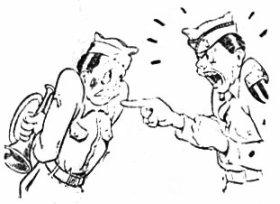
|
OVER INTRODUCTION OF BUGLES
The problem of the Army bugler, celebrated in hackneyed song and story since the time of Shakespeare, came to light at an Air Transport Command base somewhere in India, where a search for three buglers almost precipitated a "mutiny" among G.I.'s.
To most bases overseas, especially in India, a bugle has become something that songs are written about, or to which Hollywood soldiers awake and make the usual trite remarks about committing mayhem on the parties blowing same. At least, this was the consensus of the India-anchored boys, until, one afternoon, the Special Service Office informed the C.O. that three bright and shiny bugles had arrived.
Immediately clandestine meetings arose. G.I.'s disturbed by this threat to their sovereignty and comfort, signed their names in blood at hooded meetings, with intensity of purpose and ferocity. The Enlisted Men's Protective Association, which was formed by a fusion of all G.I.'s threatened death by cobra-whippings to anyone who so much as admitted that he had once held a bugle in his hand.
However, Lt. Col. Charles Marr, Base Executive Officer, issued the ultimatum that unless three buglers were uncovered within a few days, a program of holding reveille each morning would be instituted. But, ran the appeasement policy of the colonel, the first bugler showing up would have the privilege of dating the first WAC that would someday appear on the post. (Hollow, croaking laughter.) Also, the buglers were not wanted for reveille formations, but for "Retreat." That is, unless the buglers didn't show up, there would be retreat, reveille, mass execution of hostages, and other gentle means of persuasion.
The "EMPA" began to waiver in its adherence to the policy of "no surrender." Anonymous letters, phone calls, carrier pigeons and smoke signals began pouring in to Base Headquarters. The wary enlisted men were weighing the "amnesty," but still they were taking no chances. They began to come forth and admit they knew the mechanics of the Army Bugle, Dismounted, but retained their cloak of anonymity until they were guaranteed their talents would not be perverted for use against their own kind.
Negotiations between both parties are still continuing, with the talents of the G.I. Talleybrands, Henry Clays, and Gladstones pitted against the forces of A.R. "spit and polish." The colonel has been reported to be consulting catalogues on mechanical record-playing reveille equipment, while the enlisted men are sitting silent and "watchful waiting" has become the policy.
Demo Squad In Burma
By Pvt. ROBERT PAGLUCCI
MYITKYINA - After you've captured a place, you have to clean it, if you plan remaining there. In the case of a place like Myitkyina, cleaning up means considerably more than burying the dead and repairing the damage to the town. It is necessary to locate and detonate the many dud bombs, shells and cartridges which litter the landscape
|
One demolition squad which helped clean up Myitkyina was led by Lt. Joseph Moriarity and composed of Pfc. Emmett Gravely, and Pvts. Paul Bauman, Donato Falcone, and the writer. We are all members of the Corps of Engineers, who have been specially trained in demolition work.
We have blown both American and Jap duds and we figure that there is about three Jap duds for every one of ours. By and large, we don't think that Jap ordnance was particularly good, at least at Myitkyina.
One item that gives us a fair amount of trouble is Jap booby traps. Two types we've run into operate like this:
One is the pressure type. The Jap hand grenade is ignited by hitting the cap on a helmet or a rifle butt. In the pressure-type booby trap, holes are dug in the ground to fit two grenades, with the caps sticking out about an inch above ground. The pins are pulled and a plank placed over the grenade caps. When you step on the plank, it breaks the caps and six seconds later... boom! (The crack of the caps isn't much warning. They sound just like dry twigs.)
In the trip-cord trap, a cord is strung out in the grass across a path. The cords run to a stone, hung on a small bush or limb. When you trip over or touch the cord, the rock falls on the cap of the buried grenade and again... boom!
We've had a few close calls. One day, detonating three heavy artillery shells, we were bunkered down behind our jeep, hanging on to the detonation wire. When we blew the shells, the base plate of one of them hit the front bumper and smashed it into the radiator. None of us got hurt, although naturally we nearly jumped out of our shoes with fright.
One day we blew up a Jap aerial bomb and after the smoke had cleared away, we discovered that we had opened up a Jap graveyard. Nine of them, all rolled up in blankets. One of them had committed hara-kiri. He had a knife stuck in his heart and his hand clutched around the knife handle. In his other hand was a note to his wife. It read:
"Dear Wife, I am writing this note to let you know I am going to kill myself. I can hear the sun goddess, Ameterasu, calling for me. I will be waiting for you in her kingdom. Goodbye, dear wife."
Interesting people, the Japanese.
Twins Pilot Same Plane
1328TH ATC BASE UNIT, ASSAM - Both members of a "Pat and Mike" team who have been anything but a joke to the Japs for the past year were awarded the Distinguished Flying Cross in a ceremony which took place at their base recently.
Members of this double-trouble team are Lts. Patrick L. and Michael V. Doran, twin brothers, who have been piloting transport planes over The Hump. Each earned his DFC by participating in over 300 hours of operational flight.
PAIR ALTERNATE
Flying together, the brothers alternate, one handling the stick going out and the other taking over on the return trip. Michael is ready to return to Uncle Sugar, but will wait around a few extra weeks until brother Pat becomes eligible.
Mike was reticent in an interview, refusing to concede that he and Pat had done anything which any other pilots flying the same route haven't done.
NO SPECIAL BOW
He said, modestly, "I guess everybody flying The Hump has had his moments at one time or other."
Maj. Claron U. Pratt, their commanding officer, who presented the medals, also pinned on the breasts of other members of his command: One Oak Leaf Cluster to the DFC, 23 additional DFC's, eight Clusters to the Air Medal and 12 Air Medals.
ATC PAYS DEBT TO BENEFACTOR OF HUMP JUMPERS
CALCUTTA - The ATC has repaid, in some small measure, a debt to a notable benefactor of its Hump fliers. Recently flown from China to Calcutta, and then safely seen aboard a plane bound for Bombay whence they were to travel to their home in England, were the Rev. Harry G. Fisher, British field worker of the Tibetan Border Mission and his five children.
Fisher, stationed for the past 16 years in the Lan Ping District of western Yunnan, during the past year provided food, clothing, shelter and medical care for 17 Americans who have later "walked out," and buried seven who
|
On Nov. 23, 1943, the first four wandering ATC bailouts found their way to the Fishers' home for a 10-day stay which was to start them to their base and to safety.
The visits of subsequent distressed airmen varied from four days to 20.
(The Rev. Mr. Fisher never would accept anything in repayment of his kindness. He asked only whether it would be possible to drop some canned foods to replenish his larder, and some extra blankets in order to take better care of future visitors.
Among Fisher's American guests was a non-flier, Lt. Robert Wesselhoeft, Jr., stricken with infantile paralysis, while on a photo-mapping expedition. Unable to breathe, Wesselhoeft was kept alive 14 days at the Fisher mission by artificial respiration, and then flown out in an L-5 whose pilot, Maj. Welch, worked the lever of a primitive lung-compressing apparatus with one hand and flew the little plane with the other for three hours. Wesselhoeth was later taken by ATC to Calcutta in a hospital plane and after more than two months in a hospital, was flown to Washington in an improvised iron lung, stopping at the Azores to pick up Lt. Mary E. Hoadley, a flight nurse who had once attended Fred Snite, Jr., in his iron lung in Miami. Lt. Wesselhoeft arrived in Washington sufficiently recovered from his ordeal to joke with reporters.
Several months ago Capt. Rolland Bennett, an ATC officer, visited the Fishers to coordinate search and rescue activities with them. Among the articles he carried into the jungle with him was an assortment of toys for the children. Bennett remained there two weeks, and during his visit learned that Fisher was under doctor's orders to leave the high altitudes of the area. On returning to his base, Bennett arranged air transportation to India. First came a six-day journey for the family through the desolate mountains, accomplished by mule train, and then a motor jaunt to the nearest air base. It developed that the two youngest children had never before seen a horse-drawn vehicle, let alone a motorcar. On arrival at the military establishment, they beheld their first electric light.
Crossing The Hump, the three youngest were each in the care of an American, in case of the necessity of a jump. Alfred and Ivy, the oldest, were instructed to jump alone but with static lines to open their chutes automatically.
Mr. Fisher is going home to England for good now. All their possessions remaining at the mission have been sold. The five children are his greatest care, their mother having died.
The Fishers took with them more than one tangible evidence of American gratitude, among them the shoes worn by the children on the trip. Shoes are not easily obtained in the Yunnan wilds, and Maj. Morris Kaplan, commanding officer of an American medical air evacuation unit and one of the Fishers' close American friends, heard that some were needed at the mission. He requested the children's graduated foot sizes, had five pairs of shoes made and dropped them next time he flew over the lonely settlement.
SEEDLOCK BURMA ROAD BOSS
|
SOUTHWEST CHINA - Thirty-one-year-old Col. Robert F. Seedlock, CE, of Lakewood, O., is the new commanding officer of Burma Road Engineers, now engaged in pushing through the final stretch of road to connect India supply bases with China.
Seedlock, formerly Assistant Theater Engineer, succeeds Lt. Col. Louis Y Dawson, Jr., CE, who has returned to Washington.
Burma Road Engineers have greatly increased their activities in the last three months, boosting personnel by about 350 percent, getting in a big tonnage of new equipment over The Hump, and working closely with Chinese road engineers, civilian workers and troops to push through the new road, build bridges, widen and improve the old sections of the Burma Road.
Work on the India-China road traverses barren country. In some places, native workers are fed rice dropped by planes. Parties keep in touch with each other by radio. Expert medical care is provided to keep all work going at top speed.
The whole operation is assisted by Services of Supply, China Theater, to which the Burma Road Engineers are attached, and which is commanded by Maj. Gen. Gilbert X. Cheves.
Seedlock's home is at 2285 Riverside Drive, Lakewood, O., but his wife and their two children are living temporarily at 105 East Oglethorpe Avenue, Savannah, Ga.
|
TENTH AIR FORCE HQS., BURMA - Take eight G.I.'s, 30 bucks and two bits worth of ingenuity, and what do you have? Well in the case of eight G.I.'s in question, members of an airdrome squadron of Maj. Gen. Howard C. Davidson's 10th Air Force, EAC, it was ice cream - for most of them the first in over a year.
After building the basha in which they live from odds and ends of lumber that they "picked up," the men, under the direction of Sgt. Carl W. Perry started the ice cream project. Perry was chosen the planner, because he worked for the Steffen Ice Cream Co., in Arkansas City, Kan., prior to entering the Armed Forces.
In the picture, 1st/Sgt. Joseph Martin seems pre-occupied with a copy of Time as, from left to right front row, M/Sgt. Irving C. Burdick; Sgt. Eldridge J. Lanneaux, and Pfc. James G. Carroll; and back row, Col. George Mock; Cpl. I. J. Garcia, and S/Sgt. James W. McMaster, Austin, Tex., "sweat out" Perry's workmanship.
Incidentally, the freezer that the soldiers are using set them back 30 bucks. They "manipulated" to get free everything else it took to make the ice cream.
|
PEOPLE MORE FUN THAN ANYBODY
OVERPARKED. Lt. Ray McCaffrey, Ordnance Officer at Karachi, recently received a letter from the Stockton, Calif. police court, asking him to appear in court Sept. 27 to settle a parking ticket. McCaffrey replied that he "would be glad to comply" but that he thought there must be some mistake. There was. McCaffrey had left his car with a friend who was to sell it. Before it was sold, a cop found it overparked.
AIR COMMANDOS CITED BY SULTAN
HQS., AAF, I-B - Citing numerous obstacles which were overcome in successfully completing its "unusual mission," Lt. Gen. Dan I. Sultan, commanding general of the India-Burma Theater, this week tossed a verbal bouquet to the First Air Commando Group for its "performance of duty in action" early this year.
Sultan acknowledged use of this group in Burma operations in the destruction of enemy planes and positions, evacuation of sick and wounded and the carrying of troops behind enemy lines.
Their task was considered unfeasible by many, but the officers and enlisted men pitched into the job and with a numerically insufficient force turned in a superior achievement.
|
By Sgt. John R. McDowell
Roundup Field Correspondent
BURMA - Today, the spirit of Paul Bunyan rides high on the tempestuous monsoon wind as it sweeps up from the southeast across the green desolation that is North Burma. And his booming, thunder-clap laughter is re-echoed by his mortal henchmen who have defied the elements to set up a vast timber industry in the matted, primitive jungle.
Capt. E. V. Roberts is not in character with the popular conception of a timber king. Quiet and unassuming, the captain is a product of the United States Forest Service, with which he served as regional survey director of the Appalachian Forest Preserve Experimental Station. But that was in those far-off civilian days. Today, as commanding officer of the first G.I. forestry outfit in the Far East, he has exploited the vast virgin timber resources of Assam and Northern Burma to such an extent that lumber is now the Army's No. 1 industry here.
When I first met Roberts, he was a mighty weary man. His two mills in Burma's Hukawng Valley had just completed what was probably the largest emergency military order for lumber ever given a G.I. forestry outfit: a million board feet in 30 days.
The order was placed during the height of the summer monsoon. And it was a rush job. Engineers decided to construct a causeway across a flooded area.
The construction of the causeway meant lumber - lots of it. Pilings, crossbeams, supports, flooring, railing - two miles of up to 1,000,000 board feet lumber. Translated into everyday terms, 15,000 board feet of lumber is needed in the construction of the average five-room frame house. Thus, in a month's time, two G.I. sawmills, supplied by G.I. logging crews, produced enough lumber to build 67 five-room frame homes!
For 30 days the men worked 10-hour days, seven days a week, to fill the order. The two mills, equipped with 60-inch circular saws and 90 horsepower Allis-Chalmers edgers, turned out as much as 43,000 board feet of lumber a day during that hectic month. (According to specifications and performance guarantees, the Corinth Mill used by the Army has a top production level of 12,000 board feet per day.)
In discussing his outfit's record output, Roberts says, "There's only one factor which made it possible for us to fill that order. That is experience. Practically every man in my outfit is a veteran logger or mill man. As civilians, they were the timber-fallers, the gyppoes (independents who fall timber at contract for so much per thousand board feet), the bull-bucks (timber bosses), the choker-setters, the knot-bumpers, the catskinners, the sawdust-eaters of America's timber empire. They worked the camps from Maine to the big trees of the Far West. And in the Army they're carrying on their skills for Uncle Sam. "They're a great bunch of men."
Later, I learned firsthand what the captain meant. We drove up the Hukawng from mill headquarters about six miles to the logging camp. Here, in a clearing beside the Ledo Road, a G.I. was operating a crude derrick mechanism which was mounted on the body of a dilapidated truck. The derrick consisted of a long pole, controlled by a network of cables, and a main line on the end of which was large steel tongs which bit into huge logs which were lifted high in the air and loaded on trucks. To my inexperienced eye, it resembled a gin pole on wheels.
The captain pointed to the machine. "That," he said, "is the pride and joy of this outfit. It's a home-made jammer, designed and built by two of our men."
A jammer, the captain explained, is a piece of equipment known primarily to Far Western loggers. Its chief value is its maneuverability and performance record in lifting heavy weights. It is used where logs have to be hauled to the mill by trucks and where the timber is big.
The Army T.O. for a forestry unit calls for the use of stiff legs in the loading of logs. Roberts' men, however, found the stiff legs to be awkward to handle in the dense Burmese jungles, so Pfc. Walter Nourse of Portland, Ore., and Sgt. Pat Treat of Priest River, Ida., both veteran Far Western logging contractors, designed the jammer, patterning it after equipment they had used in civilian life.
The resulting homemade rig was a conglomeration of "midnight requisitioning" and discarded equipment.
|
Nourse was operating the jammer. Every time he'd push or pull a lever, the jammer would creak and groan and a heavy log would lurch off the ground, dangle in midair for a moment then swoop gently down on the truck, scarcely jarring the vehicle.
Looking at the maze of levers and cables and gears with which Nourse toyed so casually, I remarked, "Don't you ever miss the truck when you're loading logs?"
Nourse grinned and pushed a faded fatigue cap back over his straight black hair. "Brother, when you've operated one of these things as long as I have, you could use it to serve a 12-course dinner and not spill a drop of gravy."
I followed Roberts along a narrow trail a half mile into the jungle. Every few yards we stopped and scraped ugly, purplish leeches from our clothing and skin. "How do the loggers stand these dammed leeches?" I asked the captain.
"They rub mosquito repellent on their clothing and body before coming into the jungle," he replied. "We have found that Mr. Leech has a heavy dislike for repellent."
Deep in the jungle, we found the loggers at work in a stand of giant hollong trees. Cpl. Wright Vander Wegen of Thorp, Wis., and Pvt. John Spaulding of Ketchikan, Alaska, were preparing to fell one of the giants. First step in the felling operation was to notch the tree. This is done to control the fall of the tree in the desired direction.
After notching the tree, the men started the main cut on the trunk of the tree, about three feet above the ground and opposite the notch. Using a gasoline-powered Mercury chain saw, the loggers quickly worked into the heart of the tree. Within four minutes, the tree began to rumble and creak. Slowly, the 100-foot giant leaned forward, then with a reverberating crash it thundered to earth, bringing with it a shower of vines and leaves. As the clouds of debris settled back down on the jungle, we measured the stump of the tree. It was 40 inches in diameter.
Another West Coast method of logging has been adopted in the Burmese jungles, Roberts said. It is known as the springboard method of felling trees, and is used on big timber which swells drastically at the butt. In such instances, the usable timber starts approximately seven to 10 feet above the ground.
|
We found a large tree a short distance away which Pfc. G. K. Gunderson of Wallace, Mich., Pvt. Russell Stewart of Sheboygan, Wis., and Pvt. Skoviera were preparing to fell with the springboard method.
Working on either side of the tree, Gunderson and Stewart notched the tree with their axes about three feet above the ground. Flat pieces of timber, approximately six feet in length and 18 inches broad, were lodged in these notches. Gunderson and Stewart then climbed onto these springboards and notched the tree again, this time six feet above the ground. The springboards were then placed in the new notches and the men climbed up on their high perches and began chopping the direction notch about nine feet above the ground.
The men worked in perfect rythym on the narrow springboards, never losing their balance as they swung their axes. Skoviera was the relief feller. He replaced Gunderson on the springboard, Gunderson rested a few minutes, then replaced Stewart. This rotation continued throughout the felling operations.
After a deep cut had been made in the tree, the loggers started a fresh cut on the opposite side of the trunk with a two-man 60-inch hand saw. Minutes passed. Then the huge tree began to creak threateningly. Gunderson handed the saw down to Stewart on the ground, then skoviera and he leaped from the springboards as the tree crashed to earth.
Back at the loading area, we followed a loaded truck down the Ledo Road to the sawmill. As the converted 6x6 started out, sagging under its load of six logs, Roberts said, "Don't ever let anyone sell American equipment short. We've been using those 6x6's to haul our logs for months now. Each trip with a load avergaes between five and 10 miles, and a truck carries a 600 percent overload. So far, we haven't had a single breakdown despite such punishment. Brother, that's performance!"
Lt. Marvin S. Houston, who owned a sawmill in Pitkin, la., before the war, is in charge of the outfit's No. 1 mill. "Since January of this year," he said, "my boys have turned out 7,000,000 board feet of lumber. Which isn't hay for a small G.I. mill."
The mill turns out lumber in sizes varying from one inch by 2 inch by 10 feet to 12 inch by 24 feet. Some
|
Ninety percent of the timber run through the mills in North Burma is hollonng (Dipterocarpus macrocarpus) or makai (Shorea assamica). Both trees, 100 to 150 years old when ready for cutting, are evergreens common to Asia. The wood, when cured, is similar to North America's walnut, oak or maple and, if exploited commercially, could be used for furniture and interior finishing.
The hollong produces the heaviest wood yet used for lumber. It weighs 100 pounds per cubic foot and is one of the few known species of trees which is too heavy to float. The makai, on the other hand, is of average weight for a hardwood, weighing 55 pounds per cubic foot. A few nahor, or ironwood trees are found in North Burma and have proved quite satisfactory for bridge timbers. Practically all trees encountered by the G.I. loggers in North Burma thus far have been evergreen. In fact, Roberts has seen but one connifer, and that was in the middle of a swamp.
Roberts' proudest record is that his men lost only five working days during the past monsoon. Prior to the rains, it was feared that continuous mill operation would be impossible during the period from May until October. But the mill ran seven days a week, month after month, with but few exceptions during the rainy season.
Many times, the captain said, powerful bulldozers became mired in the mud. And it took, on most occasions, two D-7 cats and a TD-18 to pull out the stalled machine.
The only solution to the mud was the constant construction of new access roads into the jungles over which the logs could be skidded out to the loading area. Then men built corduroy roads, plank roads, gravel roads and when each road would bog down and become impassable they would construct another.
At the forward logging camps in Burma, where heavy equipment was not available during the monsoon, elephants were used to drag the timber from the swampy jungle to the road. The elephants were driven by natives, and each beast made on the average of three to four trips into the jungle for logs per day.
This was a slow but sure process. Each elephant would slowly drag a heavy length of timber out to the road, sometimes sinking up to its belly in mud and stagnant water. Each trip took nearly an hour and a couple of trips a day exhausted even the largest and most powerful of the elephants.
farther south in Burma, the forward contingent of Roberts' unit, with Lt. James Pouncey in charge, will tell you that they've been the real trail-blazers of the G.I. loggers. Once, the No. 2 mill deatchment - their official designation, set up logging and sawmill activities beyond the point of the Ledo Road, within sound of Jap gunfire. Since then, they have moved forward with Road Headquarters as the Ledo Road pushed on south into Burma, supplying timber for advance bridges and military installations.
|
Lt. Pouncey, who was in the lumber business in Stevenson, Wash., before the war, has his share of timber veterans, too. Such men as Sgt. Eugene Raymond of Clallan Bay, Wash.; Sgt. William Buchanan of Riverside, Calif.; T/3 Carl Blakeslee of Union City, Pa.; T/Sgt. Clark Hobbs of Manassas, Va.; Pfc. Harry Fredy of Sagola, Mich.; Pfc. Jack Plotts of Troy, Mont., and Pvt. Carmen Hernandez of Salina, Kan. are typical of the veteran lumbermen who are carrying their civilian skills on over into Army life.
T/5 Blakeslee, chief sawyer of the mill, is a flesh-and-blood refutation of the theory that "fathers aren't going to be drafted." Blakeslee, who was drafted before the war was many months old, is the father of six. "I am slightly puzzled," he says, "when I keep reading in the papers that fathers are about to be drafted."
To which his fellow loggers snort derisively, "Horsefeathers, Blakeslee. With all those dependency allotments you've found a home in the Army."
I don't know whether it has anything to do with the tree that is reputed to grow in Brooklyn, but Flatbush has its representation in the Forestry outfit. And, to add the expected screwball flourish, two of the Flatbushites are identical twins. Pfc. Robert Liptak was the first of the brothers to join the outfit. His brother, Pvt. Frank Liptak, transferred to the Forestry unit just before it sailed for overseas. S/Sgt. George Gallagher is the third Brooklynite.
"I don't suppose any of the three ever saw a tree before they got in the Army," Pouncey chuckles. "But they're really making up for lost time over here."
I remarked to Roberts during the course of our talks: "There must be great amounts of timber in North Burma which still haven't been touched."
Roberts agreed. "And it's high-grade lumber, too. Cured properly, it would make fine furniture or interior finishing."
"Then, do you believe the British will be able to exploit these timber resources after the war, using the Ledo Road?" I asked.
Roberts shook his head. "Definitely not. There is no market in this part of the world for lumber. Too many impoverished people who build with bamboo and mud. And transportation costs by road and rail to the ports at Calcutta or Rangoon would be prohibitive."
GERMANS NAMED 'EARTHQUAKERS' GROUP
"EARTHQUAKERS" BOMB GROUP - "Here comes another earthquake!"
A captured German soldier made that statement when he described the terrifying effect on him and his buddies by the frequent and devastating visits of a certain B-25 Bomb Group, during the North African campaign.
The Nazi Superman probably doesn't know it, but he gave the name to that medium bomb group of the 10th Air Force. The "Earthquakers," probably the "movingest" outfit in the whole AAF.
The "Earthquakers" left the States in July 1942, for the express purpose of supporting Field Marshal Sir Bernard Montgomery's Eighth Army drive in the North African campaign. From there they went on through the Tunisian, Sicilian, and Italian campaigns. Then after 19 months overseas, came a boat ride - to India.
Comparing the bombardment of this outfit to an earthquake must seem to the Jap to be the biggest understatement of the war. - By T/Sgt. WALLACE WEINSTEIN.
GIFT USED TO LINK INDIA, CHINA
|
By Sgt. John R. McDowell Roundup Field Correspondent
ALONG THE LEDO ROAD - In December 1943, employees of the Iowa Manufacturing Co., of Cedar Rapids, Ia., donated one Sunday to the assembling of primary and secondary units of a 25-cubic-foot screening and crushing plant. When completed, this heavy engineering equipment was given to the Armed Forces as a tribute to the memory of one of the plant's employees - Louis Parks - who was killed in action in the Atlantic, Jan. 28, 1943.
Today that equipment - a product of the sweat and devotion of Mr. and Mrs. America everywhere - is being utilized in the production of vitally needed gravel for the new portion of the Ledo Road in the Myitkyina, Burma area, where this military highway starts its last lap toward a linkup with the old Burma Road.
When Lt. John Fiske of Peoria, Ill., heavy equipment officer at an engineer base depot in Assam, and his men processed the crushing units and prepared them for shipment up the Ledo Road into the jungles of Burma, the equipment had completed a 14,000-mile trip over the longest supply line in the world. Before arriving at the terminus of the Bengal and Assam Railway, the crushing plant had been transported by ocean-going freighter, broad-gauge railway, river barge, then narrow-gauge railway.
At the engineer depot in the jungles of Assam, the equipment was assigned to an aviation engineer unit working on the new trace of the Ledo Road and was shipped up the road with the first overland convoy to go into the Irrawaddy River part of Myitkyina from India.
A LITTLE CHILD HAS TOLD THEM
The following communication, addressed to the officers and men of the U.S. Army Air Forces, was written by a 10-year-old Chinese schoolboy to the 14th Air Force.
There isn't very much to say about this letter which isn't in the letter itself. Some way or another, any comment on the courage and vitality of the Chinese youngster would fall inadequate.
This is what the schoolboy wrote:
|
My Most Respectful and Admirable Officers and Soldiers of the American Air Forces:
In the day time I have to study my text books and school lessons, busy to seek out a suitable way of fighting down the brutal Japan. During the recess time my teachers encourage me to take daily exercises, intent to make me an iron man, full of spirit and strength, to prepare for the future need, so that I can hardly have time to make any contact with you. When night comes, I often hear the buzzing sound of your airplane from north to south, south to north, carrying bombs to attack Japan. The bombs you drop, as if you are cooking hard boiled eggs to treat Japan, she ought to receive the delicious taste with special feeling. When I throw myself into these interesting and exciting thoughts I am not able to get into sleep. I watch the clock strikes ten, eleven, twelve... etc., again the buzzing sound is heard, telling me you are safely home with victory, then gradually I fall into happy dreams. My Dearest Officers and Soldiers, we are greatly moved by your brave action, your intelligence, and your helpfulness, which will bear in our hearts forever. Your hard work and your good deeds are known to every one in every corner of the world. How can I show you my gratitude? Since I am only a boy of 10 I am not able to fight with you shoulder to shoulder in the battlefield. Today I am giving you my little soul, the most precious and pure soul, in order to express my respects to my dear American Officers, Soldiers, and Friends. With Best Wishes, I am, Yours most sincerely, WONG YUNG-JI |
FIRST ACE FOR BANSHEES
BURMA - Four Jap fighter planes in a flight of 12 went down in flames recently north of Mandalay when two patrolling P-47's of the Burma Banshees group, 10th Air Force, EAC, broke up an attack on transport planes in the first show of enemy strength in North Burma in many months. Outcome of the brief air skirmish resulted in producing the first ace in the 10th Air Force, Lt. Samuel Eugene Hammer, 24, Neal, Kan., who bagged three of the four planes to bring his total victories to date to five. Hammer's wing man, Lt. Steadman L. Howarth, jr., Denver, Colo., knocked out the fourth Jap plane, his first destroyed.
Hammer, relating the air battle said: "Howarth signaled that he saw four Tojos, as had I, so we pulled over and started a diving attack. I chose the leading Jap. He saw me and stepped up his speed, but I had built up speed in my dive and followed him closely."
After several bursts from Hammer's guns, the Jap pulled up suddenly and then went into a spin to crash into flames. Meanwhile, two other Tojo's had closed in on Hammer's tail. Hammer got both of them after brilliant maneuvering.
In pushing the engine on his P-47, Lt. Hammer's plane developed engine trouble and he was forced to make a landing on an unfinished 10th Air Force field a short distance from the enemy line, his cockpit filled with smoke.
Hammer destroyed two bombers of a 45-plane Jap raiding formation over Assam last March.
LONG-DISTANCE BLIND DATE FOR LONELY G.I.'s
|
AIR TRANSPORT COMMAND BASE, INDIA - A score of young women - most of them British, a few Americans - had a long-distance blind date recently with G.I.'s on the refueling base of Masira off the Arabian coast, a veritable pinpoint on the map.
The idea germinated in the mind of Capt. J. Freitas, CO of the men stationed on the island in the Central African Division, ATC. While visiting this base in the ATC's India-China Division on other business, Freitas met Mrs. A. Wrench, British woman in charge of liaison welfare work here. He wondered aloud whether it wouldn't be a good idea to have a few girls around for a holiday dinner. Mrs. Wrench agreed and began her mission of rounding up the women in India.
The ICD made arrangements for clearance of the women for the "date" and the Central African Division furnished a plane for the 600-mile hop to the island the night before the dinner. For 16 of them it was their first flight. They spent the holiday with the Yank G.I.'s, enjoying a dinner at noon and a dance at night. The following day, they dined with a small group of RAF men also stationed on the island; the next day returned to this base.
Those who helped swing the deal from the India end of the line were Maj. John Silva; Capt. Crumpton Snowden; and S/Sgt. Thomas Bradshaw.
On arriving at the Arabian Sea island, in the early morning hours, the 20 women were treated to grilled cheese sandwiches and hot coffee before going to bed. On the following morning, they and all G.I.'s off duty then went swimming and had a beach party.
The dinner lasted one and a half hours and the food was the typical American banquet fare: Turkey, cranberry sauce, stuffing and dressing, candied sweet potatoes, pies, etc.
Bridge-playing, strolls around the island, tea and cookies were the business of the afternoon. Following supper, which took place at 1800 hours, the ladies retired for a change of dress. In the meantime, the mess hall was cleaned for dancing. The dance took place in the evening.
The return trip, Friday afternoon, was the cause for more excitement. One engine developed a "cough or spit or something," as it was termed by one of the ladies, and the plane had to turn back. Since 16 of the women were plane-riding for the first time, much anxiety developed. But possibility of having a planeload of much concerned women in addition to engine trouble disappeared when the mechanical "cough" was finally corrected and the plane retraced its course, landing in India late that evening.
The women were unanimous in expressing pleasure at having taken the trip to dine and dance with the G.I.'s. They want to know, "When is the next trip?"
Dorn High In Praise Of Air Raid
CHINA - The most difficult, most exacting ground support mission ever undertaken by any squadron in the "Flying Horse" Fighter Group during its 30 months of continuous combat was recently acclaimed by Brig. Gen. Frank Dorn, Commanding General of CT&CC, as the finest example of aerial-ground support he had ever seen.
In support of a Chinese drive on Lungling, the "Assam Dragon" Squadron's pilots dropped a bomb squarely on a heavily-fortified Jap gun emplacement, while the advancing Chinese hugged the ground only 25 yards away.
After the bombs were dropped, the Chinese inched slowly forward with panels on their backs to mark their positions. The planes swooped down again and again to strafe only a few feet in front of the advancing troops. The combined land and aerial attack proved too much for the Japanese, who had planned to make a stand to the last man. They broke and ran in an effort to escape the devastating attack.
JAPS DRIVEN BACK
The attack was the result of an attempt by the Chinese to cut off the Japanese in the city of Lungling either from reinforcements or from an escape route. The Chinese, cutting south of the city to set up a road block, had driven the Japs back until the Nips had fallen back upon an impenetrable machine gun emplacement overlooking the Burma Road and which, if held, would make a road block impossible.
The "Assam Dragon" Fighter Squadron of Maj. Gen. C. L. Chennault's 14th Air Force was called upon for aerial support. Lt. Col. John Habecker, flight leader and squadron commander; Maj. Albert Criz, squadron operations officer, and Flight Officer John Duda, were briefed for the mission.
"It'll be like trying to thread a needle while passing it at 350 miles an hour," the C.O. said as he climbed into his plane.
HIT DEAD CENTER
Over the target the first bomb was very close, the second dropped by marksman Criz, former AVG, was dead center; the last one was also very close. Then they strafed. The Chinese took the position, ensuring the fall of Lungling two days later.
Back at their advance base, the pilots found a commendation waiting for them from Dorn which said that the position had been taken and not one Chinese soldier had been injured during the extremely close aerial support.
Veil Lifted On Kachins
It was revealed this week that groups of Kachin guerrillas organized and led by American Army, Navy and Marine Corps personnel, have for two years been operating as far as 150 miles behind the Japanese lines in North Burma.
The American officers, attached to the Office of Strategic Services which is headed by Brig. Gen. William ("Wild Bill") Donovan, have spent weeks in the jungles, living and fighting with units composed entirely of Kachins.
The "American Kachin Rangers" have accounted for more than 3,000 Jap dead, while suffering losses of about 25 men.
Throughout the Hukawng, Mogaung, Myitkyina and Bhamo-Katha campaigns, the guerrillas were active far in advance of the Allied armies, ambushing Japs at tactical points, disturbing enemy communications, blowing up supply dumps and generally harassing and confusing the Japs.
|
TENTH AIR FORCE HEADQUARTERS, BURMA - War is hell, as some sage observed, particularly when you have to teach children about air raids, like "Queenie" did.
"Queenie" is a petite Burmese lady dog. She lived in a town in Northern Burma during the Japanese occupation and survived the daily bombing by the 10th Air Force planes, so she qualifies as an expert on air raid precautions. When the Allied forces captured that particular town, "Queenie" wandered over to a squadron of the "Burma Banshees," fighter outfit with the 10th Air Force. She was adopted by the boys.
After a couple of months, Capt. George C. Mueller, the squadron surgeon, discovered that "Queenie" was going to have pups. The medic delivered a litter of six.
Then came a new phase in "Queenie's" war. The Japs started a little bombing of their own. But she was up to the situation, and, for the first several raids, she'd pick the pups up, one at a time, and deposit them carefully in their own foxhole, "K-9 Type."
The puppies naturally objected to such handling on the first raid, but only the first. And now, as the pups grow older and wiser, all "Queenie" has to worry about when the red alert sounds is being able to keep up with the youngsters on the way to the foxhole because they, too, now know exactly what to do.
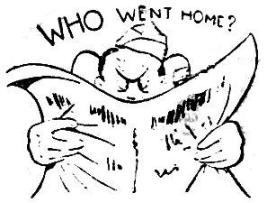
|
WHAT FURLOUGH?
CEYLON - T/5 Loel Frederickson of a Service Signal Battalion is beginning to wonder whether the Army is keeping something from him.
Frederickson, who hails from Isle, Minn., recently ran across this item in the Minneapolis Star-Journal.
"Loel Frederickson, former Minnesota gridder, has arrived home on furlough. Loel is stationed at Lord Louis Mountbatten's headquarters in Ceylon."
The catch? - Frederickson hasn't been home since he left the States early in 1944. Evidently, Army officials don't read the Minneapolis Star-Journal;. - By Pfc. BOB REES.
ASC MEN COLLECT FUND FOR WIDOW
BANGALORE, INDIA - Enlisted and commissioned personnel at the Air Service Command Depot have collected and forwarded $500 for Mrs. Wilbur A. Jorgensen, widow of Cpl. Wilbur A. Jorgensen, who met accidental death in the line of duty recently.
Jorgensen, member of an MP detachment here, was also survived by a four-year-old son, Kenneth. A surplus of $55 is being used to buy the boy Christmas presents.
The collection was organized by T/Sgt. Louis Wysocki and Pfc. Andrew Palovchik, both of whom knew Mrs. Jorgensen.
 AND HERE ARE RESULTS
AND HERE ARE RESULTS
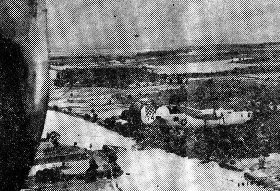 The Seventh Bomb Group of the 10th Air Force is slugging the Japs again after completing a gas-hauling stint
over The Hump last monsoon. Here above, is a bomber going over a destroyed Japanese bridge.
The Seventh Bomb Group of the 10th Air Force is slugging the Japs again after completing a gas-hauling stint
over The Hump last monsoon. Here above, is a bomber going over a destroyed Japanese bridge.
|
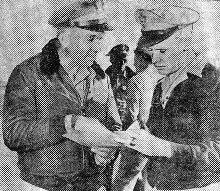 Maj. Gen. Howard Davidson, left, head of the 10th Air Force, and Seventh Group Commander Col. Harvey T. Allness
discuss picture results of the Mokpalin Mission.
Maj. Gen. Howard Davidson, left, head of the 10th Air Force, and Seventh Group Commander Col. Harvey T. Allness
discuss picture results of the Mokpalin Mission.
|
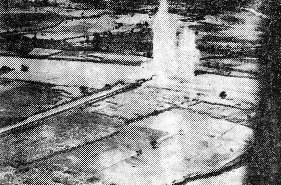 Here is another shot of the bridge busting attack of the Seventh on the railroad line connecting Moulmein and
Mandalay-Rangoon lines. The Seventh made low-level attacks to score a hit.
Here is another shot of the bridge busting attack of the Seventh on the railroad line connecting Moulmein and
Mandalay-Rangoon lines. The Seventh made low-level attacks to score a hit.
|
200,000 SACKS OF CHRISTMAS MAIL
Report on the Christmas mail situation:
The Postal Section whispers into our delicate pink ears that the current score on Christmas packages is good. It is estimated that the India-Burma and China Theaters will receive, in all, about 178,000 sacks. (This refers to mail, not WAC replacements.) There will be about 1,780,000 parcels, which will divide approximately 230,000 packages for China and 1,550,000 for I-B.
The Postal folks say that about 835,000 parcels will be delivered in I-B before Christmas Day and that China will get about 125,000. The balance of the holiday goodies will come tagging along after Dec. 25.
Moral: If you don't get a present on Christmas, cheer up - half the packages will be more or less late.
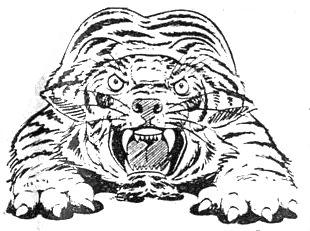
|
AAF BASE UNIT, APO 489 (Misamiri, India) - While a silent, alert and hungry tiger stood close watch over their every move, two well-dressed lieutenants spent a miserable, wet and sleepless night recently atop an unsheltered steam roller in Assam's jungle.
Returning from a shindig not far from their base one night when the monsoon was at its worst, Lts. Dominic V. Gritto and William Kaplan, dressed in their finest, had a spot of trouble. Their car became mired deep in Assam mud. So, armed only with a flashlight, the pair began slogging their way homeward. It was pitch dark. It was raining. Mud was ankle-deep.
Their grumbling over their predicament was suddenly interrupted by a pair of extremely bright eyes, staring at them from a few yards up the trail. The flashlight beam revealed that these eyes belonged to one large, Bengal tiger.
After a brief argument about who should hold the light and who should pick out the nearest large tree, the two Air Corps representatives beat a hasty retreat. The tiger, his meal assured, trotted leisurely behind.
A few minutes of the midnight flight and Kaplan and Gribb found the steam roller, quickly crawled to the top, while the tiger made himself comfortable down below, as only a tiger can during the monsoon.
The hours passed and the rain continued and the mosquitoes came and Kaplan and Griffin vainly tried to make the tiger go away by throwing their burning handkerchiefs and socks at him. But the tiger didn't bat an eye.
Then came the dawn. The tiger got up and left to go do whatever tigers do during the daytime. The drenched lieutenants cautiously climbed down from their perch and dragged their weary bodies home.
What a night. Whew!
Two Officers Given Awards
BURMA - Legion of Merit awards were presented this week by Lt. Gen. Dan I. Sultan to two officers who helped plan and execute the Allied drive that opened in the Hukawng Valley and concluded with the capture of Myitkyina.
They were Brig. Gen. Robert M. Cannon, Chief of Staff to Sultan, and Col. Joseph W. Stilwell, Jr., Assistant Chief of Staff and son of Gen. Stilwell, former CBI Commander.
ROOSEVELT, GISSIMO EXCHANGE MESSAGES
WASHINGTON - (UP) - The State Department this week revealed that in exchanges of messages on the third anniversary of Pearl Harbor that President Roosevelt told Generalissimo Chiang Kai-shek he was confident China "will worthily share in the approaching phase of final victory."
The Chinese leader assured Roosevelt that China will "soon be able to inflict a crushing defeat of the Japanese."
Record Topped
BY TWO PILOTS
10TH AIR FORCE HQS., BURMA - Two veteran P-47 fighter pilots of the 10th Air Force "Burma Banshees" Group now boast a theater record for the most combat missions.
The two new title-holders are Lt. Charles F. Heil, with 207 missions, and Capt. James F. May, with 205 combat trips. After smashing the previous record of 201 missions, held by Maj. Owen R. Allred, the two flight commanders are now battling away for individual honors.
Heil, a dive-bomb specialist, hold the Distinguished Flying Cross with two Oak Leaf Clusters and the Air Medal with three Clusters. May wears the Silver Star, Purple Heart, DFC with Oak Leaf Cluster and the Air Medal with three Clusters.
SAGA OF THE 'VIRGIN' COMES TO AN END
|
TENTH AIR FORCE HQ., BURMA - Not long ago in Burma's jungles, the final story was written of a famous combat character - the saga of The Impatient Virgin, known affectionately as Virgie by her crew. It began almost two years ago in England. There a stubby young California pilot, F/O Mark M. Veck, of Sacramento, flew his first bombing mission over occupied France in a B-17 called Impatient Virgin. Again and again as the B-17's of the famed 8th Air Force in England made their unwelcome calls over France, Belgium, Holland, Germany and other occupied countries, Virgie was doing her bit toward crippling Germany's industrial centers. Leaving England in the latter part of 1943, after flying 25 missions, Veck then a first lieutenant, returned to the States for a much-deserved rest.
In May 1944, Veck volunteered for his second combat assignment overseas, this time in a C-47 transport in the India-Burma Theater. Beginning combat operations during the summer of this year, he again brought to life the colorful figure of Virgie, made famous over Germany. This time she was a member of the 10th Air Force.
During her 600 hours of operation over enemy territory in the India-Burma Theater, Virgie had seen action at Imphal, as well as during the crucial monsoon season in North Burma. As though completely exhausted after her two-year siege, Virgie finally gave up while on a recent combat mission over Northern Burma. With both engines gone, she gave her last cough and headed earthward. Fortunately her crew was not injured, but Virgie's spectacular career had ended.
During his combat exploits over Europe, and more recently over India and Burma, Veck has received a number of decorations. He has recently been recommended for his 13th combat citation.
Veck has decided to discontinue further use of the name Impatient Virgin, inasmuch as she "fell" in a Burma rice paddy.
|
Japs Can Have Their Quinine
By S/SGT. ART HEENAN Roundup Staff Writer
Germany developed a weapon to whip malaria; Japan forced us to use it. As a result no G.I. should contract malaria.
The weapon is atabrine. It was developed by the German dye industry and is now being mass produced in the United States, which was forced to use it as a substitute for quinine when Japan conquered the East Indies.
In preventing the onset of symptoms, experiments have shown the substitute to be better than the original in the case of atabrine versus quinine.
Allied troops fighting the Japs in Burma are far better equipped with atabrine to prevent malaria than the Nips are with their conquered quinine, declared Col. Robert P. Williams, Theater Surgeon.
THIS THEATER
In a Theater like India-Burma, where malarial-laden mosquitoes have had a rich hunting ground, atabrine, if taken as directed, will definitely end malaria down to the last single case.
The Theater commander, Lt. Gen. Dan I. Sultan, has given orders that the atabrine treatment shall be strictly enforced in areas where malaria is prevalent. He issued this order after a conference with the Theater Surgeon, wherein he was shown a report which demonstrated that atabrine has definitely controlled malaria in the South and Southwest Pacific areas. Sultan has followed up his order by holding competitions between American and Chinese units to arrive at evidence which will show the lowest incidence of malaria following the atabrine treatment.
THE RESULTS
The atabrine treatment was tested by a group of Australian scientists, who used human guinea pig volunteers for a year. At the conclusion of laborious and minute experiments, the Australian scientists proved that the taking of one atabrine tablet a day will accomplish the following:
(1) Completely suppress all types of malaria.
(2) Render transmission of malaria from an individual impossible.
(3) Any case of malignant malaria can be cured if one tablet is taken daily for a minimum of 23 days following the infection.
(4) No ill effects are suffered by the patient.
Charts show that in 1943 the South Pacific Theater had a malarial incidence rate of 700 per 1,000 men; Southwest Pacific 400 per 1,000 men and this Theater only 300 per 1,000. The lower percentage for this Theater was due to highly developed malarial control in the forward areas.
THE CHANGE
But in 1944 the Theater Surgeon noticed that South Pacific incidence had dropped almost to 100 per 1,000 men. Southwest Pacific to less than 100 per 1,000, while here we had 222 per 1,000. Williams discovered the reason was atabrine. He then had his conference with Sultan and the order requiring atabrine treatment went into effect.
"It must be stressed," says Williams, "that under no circumstances are men to relax their normal precautions against malaria. They must take as much care as in the past. But whereas we could only hope for the best in the past, now we can definitely assure them they will not get malaria - if they take that one atabrine tablet a day."
Which means you cannot give your repellent away to a jungle belle as Chanel Number Five. Nor can you use your mosquito net for chasing butterflies. As emphasized above, atabrine will cure and prevent malignant malaria even if you are bitten. But it will only suppress benign malaria, which is the recurrent type.
EVERY DAY
Furthermore, the Theater Surgeon emphasizes that even when you leave a malarial area you must still continue to take your daily dose of atabrine for a minimum of a month. He points out that many men going home on furlough have had to be taken off planes and ships for hospitalization because of developing malaria en route. Continuance of the atabrine daily dose will allow you to enjoy your furlough, whether it is at a rest camp, an Oriental city or Shangri-La.
"The taking of atabrine is one tablet a day, seven days a week," warns Williams. "There can be no day of rest if you want to make sure you will not break out with malaria."
In conclusion, don't ask us why the term, benign, is applied to recurrent malaria. benign, according to Webster, means kind, and recurrent malaria is hardly kind.
So have a Happy New Year with atabrine.
The C.B.I. Roundup is a weekly newspaper of the United States Forces, published by and for the men in China, Burma, and India, from news and pictures supplied by staff members, soldier correspondents, United Press, OWI, and Army News Service. The Roundup is published Thursday of each week and is printed by The Statesman in New Delhi and Calcutta, India. Editorial matter should be sent directly to Capt. Floyd Walter, Hq., U.S.F., I.B.T., New Delhi, India, and should arrive not later than Sunday in order to make that week's issue. Pictures must arrive by Saturday and must be negatives or enlargements. Stories should contain full name and organization of sender. Complaints about circulation should be sent directly to Lt. Boyd Sinclair, Hq., U.S.F., I.B.T., New Delhi, India. Units on the mailing list should make notification of any major change in personnel strength or any change of APO.

DECEMBER 28, 1944
Adapted from the original issue of C.B.I. Roundup
Springboard photos have been added to the G.I. Loggers story and did not appear in the orignal issue.
Copyright © 2007 Carl Warren Weidenburner
TOP OF PAGE PRINT THIS PAGE ABOUT THIS PAGE SEND COMMENTS
PREVIOUS ISSUE CLOSE THIS WINDOW NEXT ISSUE
|
|
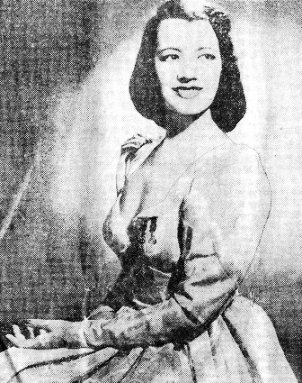
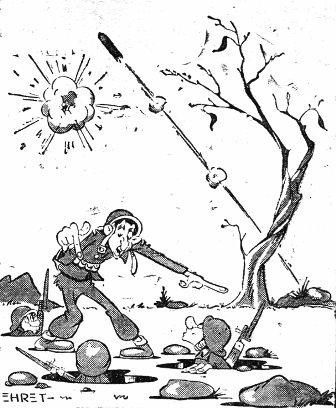
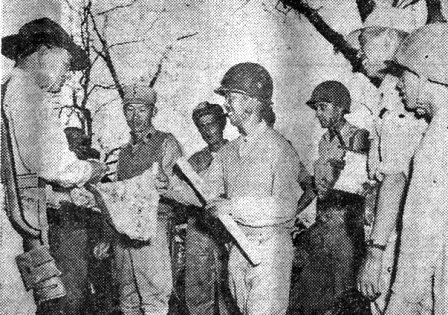 Lt. Gen. Dan I. Sultan, left, receives a Japanese battle flag from Maj. Gen. Li Hung, center, when the I-B Theater Commander visited Bhamo shortly after the key Burma town was captured from the Japs by Li's Chinese 38th Division. Also seen is Lt. Gen. Sun Li-jen, second from left, chief of the Chinese First Army.
Lt. Gen. Dan I. Sultan, left, receives a Japanese battle flag from Maj. Gen. Li Hung, center, when the I-B Theater Commander visited Bhamo shortly after the key Burma town was captured from the Japs by Li's Chinese 38th Division. Also seen is Lt. Gen. Sun Li-jen, second from left, chief of the Chinese First Army.
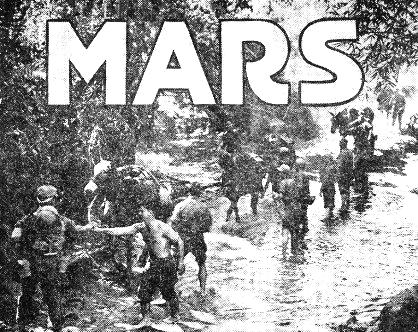 American muleskinners guide pack animals across a jungle stream as units of the Mars Task Force move up to join
the Allied push in Central Burma.
American muleskinners guide pack animals across a jungle stream as units of the Mars Task Force move up to join
the Allied push in Central Burma.
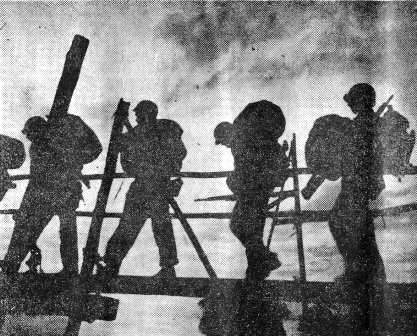 In sunset silhouette, American Infantrymen trudge over a footbridge as they prepare to move into Burma with the
Mars Task Force.
In sunset silhouette, American Infantrymen trudge over a footbridge as they prepare to move into Burma with the
Mars Task Force.
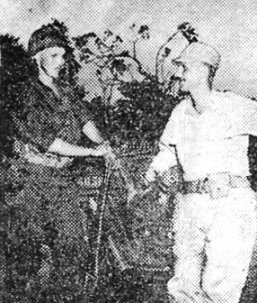 After two years of separation, Maj. Arthur M. Walker, right, of Westchester, Pa., meets his son, Pfc. Peter Walker, of Dedham, Mass., in Central Burma. Pfc. Walker is a member of the Mars Task Force.
After two years of separation, Maj. Arthur M. Walker, right, of Westchester, Pa., meets his son, Pfc. Peter Walker, of Dedham, Mass., in Central Burma. Pfc. Walker is a member of the Mars Task Force.
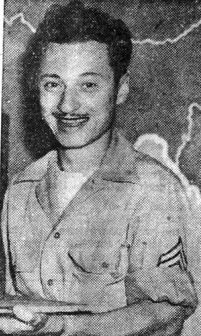
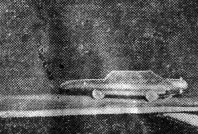
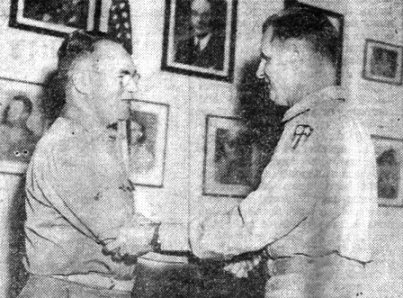 Maj. Gen. T. J. Hanley, Jr., Commanding the Air Service Command in India-Burma and China, receives the Distinguished
Service Medal from Maj. Gen. George E. Stratemeyer, Commanding USAAF.
Maj. Gen. T. J. Hanley, Jr., Commanding the Air Service Command in India-Burma and China, receives the Distinguished
Service Medal from Maj. Gen. George E. Stratemeyer, Commanding USAAF.
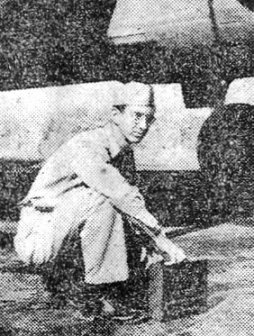 The easier, richer life for many radio mechanics in the Far East is partially attributable to such members of the
famed CBI Service Chiefs as T/Sgt. Harry H. Hughes. He designed and built the compact, portable tester shown with him
that has made it possible to test aircraft radios without their removal from fighters, bombers and transports.
The easier, richer life for many radio mechanics in the Far East is partially attributable to such members of the
famed CBI Service Chiefs as T/Sgt. Harry H. Hughes. He designed and built the compact, portable tester shown with him
that has made it possible to test aircraft radios without their removal from fighters, bombers and transports.
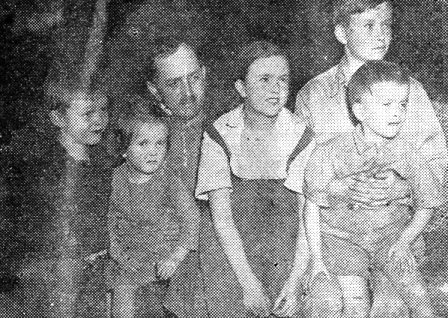
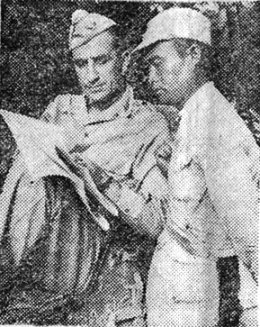
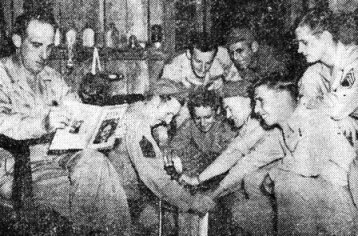 WHEN THERE'S A WILL, ETC.
WHEN THERE'S A WILL, ETC.
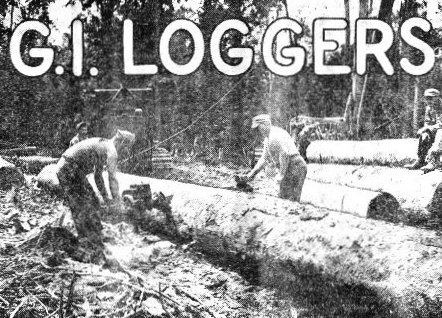 Using a two-man gas-powered saw, G.I. Loggers cut a long log into shorter sections for loading on a truck.
Using a two-man gas-powered saw, G.I. Loggers cut a long log into shorter sections for loading on a truck.
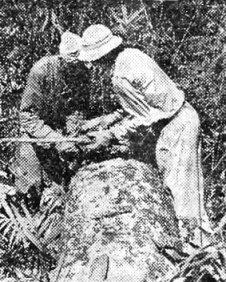 Loggers hook a choker on a log preparatory to its being skidded out of the jungle by a bulldozer to a holding
area beside the Ledo Road.
Loggers hook a choker on a log preparatory to its being skidded out of the jungle by a bulldozer to a holding
area beside the Ledo Road.
 G.I. Loggers on springboards pose after completing notch in preparation for felling big tree.
G.I. Loggers on springboards pose after completing notch in preparation for felling big tree.
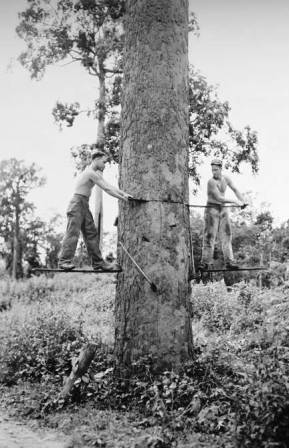 G.I. Loggers make final cut with 60-inch saw.
G.I. Loggers make final cut with 60-inch saw.
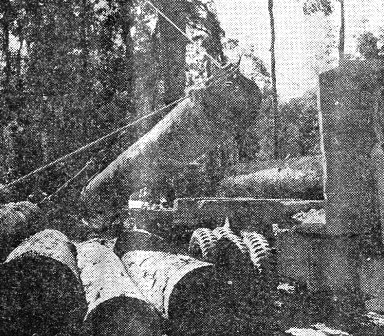 G.I. Loggers ease a log into place on a truck by means of a homemade jammer.
G.I. Loggers ease a log into place on a truck by means of a homemade jammer.
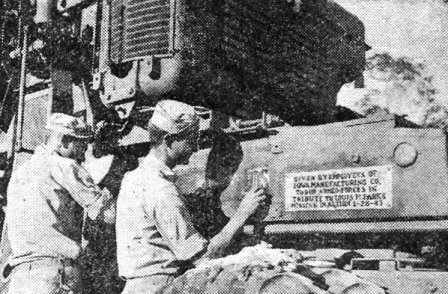
 Twenty British and American ladies prepare to emplane at Karachi, bound for a holiday dinner with G.I.'s stationed
at a refueling base in the Arabian Sea. Enroute to the Arabian Sea base, the visiting firewomen relax in a C-46 of
ATC's North African Division, which, with the India-China Division, staged the trip.
Twenty British and American ladies prepare to emplane at Karachi, bound for a holiday dinner with G.I.'s stationed
at a refueling base in the Arabian Sea. Enroute to the Arabian Sea base, the visiting firewomen relax in a C-46 of
ATC's North African Division, which, with the India-China Division, staged the trip.
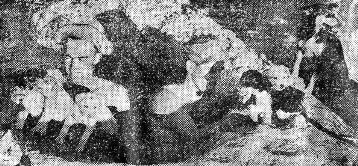 QUEENIE, HER PUPS & G.I. MASTERS
QUEENIE, HER PUPS & G.I. MASTERS